Jude Knight's Blog, page 97
June 30, 2018
Stretch goals for the next eighteen months

So a person needs stretch goals, right? I’ve just spent a few hours setting up a writing and editing schedule for the next eighteen months, creating an accountability book for recording word counts and milestones, and writing the titles on my ‘take everywhere’ notebooks for the next three books:
 Unkept Promises, Book 4 in the Golden Redepennings
Unkept Promises, Book 4 in the Golden RedepenningsThe Beast Next Door, a novella based on the newsletter subscriber short story The Bluestocking the Beast
Charlotte’s Wish, a contemporary novella for the Authors of Main Street Christmas Wishes box set.
Further across the spreadsheet, I’ve calculated the word count per day to reach the publication date. I can write 1500 words a day, but can I do it every day? We’ll see.
House of Thorns is with the publisher, and Paradise Regained goes to 2nd beta on 2 July.
And I’ve made a start on Unkept Promises, so that’s okay. Day 1. Tick.









June 26, 2018
Telling or showing in WIP Wednesday
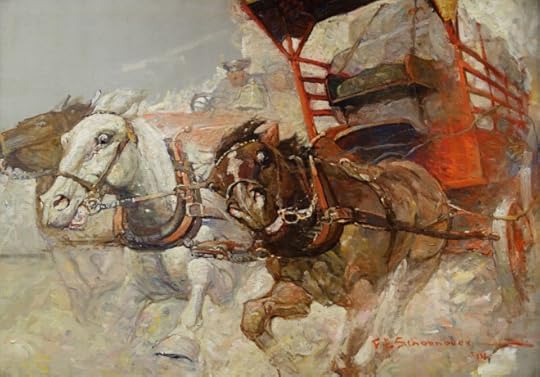 Show, don’t tell, beginning authors are told. And it’s good advice. Put the reader inside the scene and let them watch it unfolding. Don’t give them a character (or worse still, a narrator) who fills in all the backstory in paragraph after paragraph.
Show, don’t tell, beginning authors are told. And it’s good advice. Put the reader inside the scene and let them watch it unfolding. Don’t give them a character (or worse still, a narrator) who fills in all the backstory in paragraph after paragraph.
Like all good advice, as you gain more experience you know when to ignore it. Showing is usually best. Except when it isn’t. Use the comments to share an excerpt with either sharing or telling, and tell us why you chose to do it that way.
I’ve been thinking of taking one of my newsletter short stories, and turning it into a novella for a box set the Bluestocking Belles might publish for Valentine’s Day 2019. Because of the format, they tend to have a bit of telling — purely and simply to keep the story short. Like this bit from the story I might rewrite, The Mouse Fights Back. (For those who don’t subscribe to my newsletter, each one contains the start of a short story written exclusively for newsletter subscribers and a link to the rest of the story plus all the others I’ve written so far. Click on the link in the side menu to subscribe for this and heaps of other free stuff.)
They were trying to kill his Mouse.
The runaway carriage might have been an accident. Such things happen. Mouse was shopping, with Jasper and two footmen in attendance, when it careened down the street, and only Jasper’s quick thinking and quicker action saved her from injury or worse. He thrust her into a doorway, protecting her with his body, and the carriage passed close enough to tear the back out of his jacket. The footmen both jumped clear. Hampered by her skirts, Mouse could well have been killed.
The shot that just missed her in Hyde Park must surely have been deliberate, though the magistrate called to investigate insisted on regarding it as carelessness at worst. “Some foolish young man making bets with his friends. Not at all the thing. Your wife could have been hurt, and how would they feel then?” Tiberius’s own investigators found a trampled spot in the bushes, probably the place where the assassin had waited to make his shot.
Tiberius doubled the guard on Mouse when she went out, and thought about confining her to the house, but couldn’t bear to curtail the freedom she was enjoying so much as she visited the art galleries, shops and museums she’d been barred from when she was under her aunt’s paw.
His own estate, his investigation into his uncle and stepmother, and Mouse’s affairs kept him busy during the day, and he couldn’t escort her as often as he wished.
As her husband, he now owned her inheritance, but extracting it—or, more likely, what was left of it—from Lord Demetrius’s hands was proving to be difficult, with his uncle’s lawyers throwing up one obstacle after another. Tiberius didn’t need the money, but he would be damned if Lord Demetrius was going to have it. Besides, as Jasper said, if they could prove the wicked uncle had stolen from Mouse’s trust, they would have a reason to have him arrested, and the whole sorry saga could be put to rest.
And then he could spend time with his delightful, fascinating, sweet little wife, who was blossoming like a rose away from the bitter atmosphere of her aunt’s home. The old harridan’s oppression had not suppressed Mouse’s intelligence or her sense of humour. It had made her afraid of almost everything, and every day he saw more reason to admire her courage as she fought through her fear and faced the world with a cheerful smile.
He dodged five more suspicious accidents and outright attacks, but none of them bothered him as much as the crowd of drunken slum dwellers who mobbed Mouse and her footmen in the street as she emerged from his house. He sallied out with the rest of the household and drove the attackers off. She was shaken, but not hurt. This time.
“You need to send her to Redfern,” Jasper scolded, after Tiberius had hugged her, examined her for injury, and handed her over to her maid so she could wash and change. “Every time she goes out in London, she is in danger.”
He was right. At the earldom’s principal estate, Tiberius could control every inch of ground for acres around. He had purged Redfern of the few servants who owed allegiance to Lady Bowden, and those who remained had either been born and brought up on the estate, or were people of his own. She would be far safer there. But he hated the thought of staying in London alone.








June 25, 2018
Tea with the bride and groom
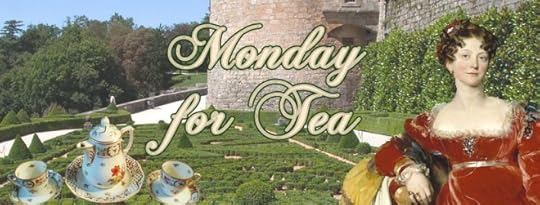
(An excerpt post from about half way through my novel A Baron for Becky, the story of a courtesan and her escape from the life into which she had been forced when little more than a child. (Blurb and buy links if you click on the book name.)
Hugh had been in the heir’s wing many times, and at Haverford, the family seat, when he was a boy. He had never entered Haverford House by the main door. Designed to impress, the approach sat back from the road, admittance through a gatekeeper.
They were paraded through the paved courtyard by another liveried servant to the stairs between pillars that stretched three stories to the pediment above.
Inside, the ducal glory continued; a marbled entrance chamber the height of the house that would make a ballroom in any lesser mansion, with majestic flights of stairs rising on either side and curving to meet, only to split again in a symphony of wood and stone. Grenford ancestors were everywhere, twice as large as life, painted on canvas and moulded from stone, cold eyes examining petitioners and finding them all unworthy.
Aldridge met them in the entrance chamber, and led them up the first flight of stairs and down a sumptuously carpeted hall that was elegantly papered above richly carved panels. Four men could have walked arm-in-arm down the middle, never touching the furniture and art lining both walls,between highly-polished doors.
Busts on marble pedestals alternated with delicate gilded tables and seats upholstered in the Haverford green, scarlet and gold, many embroidered with the unicorn and phoenix from the Haverford coat of arms. The art in gilded frames that hung both walls showed more Grenford ancestors, interspersed with favourite animals, scenes from the Bible, and retellings of Greek legends. The ornately painted ceiling boasted flowers, leaves, and decorative swirls, the many colours highlighted in gilding.
Here and there, an open door gave them a view into one large chamber after another, each room richer than the last. At intervals, curtained arches led to more halls, more stairs.
Hugh was openly gawping, and Becky drew closer to him, as if for protection.
“A bit over the top, don’t you think?” he whispered to her, and was rewarded with a quick, nervous, smile.
The duchess received them in a sitting room that, if rich and elegant, was at least more human in scale.
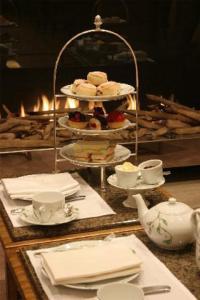 She offered a cheek to Aldridge for a kiss, and a hand to Hugh. Becky held back.
She offered a cheek to Aldridge for a kiss, and a hand to Hugh. Becky held back.
“Come, my dear,” she coaxed. “Mrs Winstanley, is it not? Soon to be Baroness Overton. You shall kiss me, my dear, and I shall be godmother to your child, since I cannot claim the closer title.”
Hugh relaxed, then. Her Grace would champion them for her grandchild’s sake. He took the offered chair, and Aldridge leant against the mantelpiece. The duchess ignored them both to focus on Becky.
She insisted on Becky sitting beside her. “Are you keeping well, my dear? Are you eating?”
“Yes, Your Grace.” Becky’s voice was so quiet Hugh had to lean forward to hear.
“You must eat several times a day, dear. More as the baby takes up more room…” she trailed off as Becky blushed scarlet. “And when do you expect the little one to arrive?”
“At Yuletide, Ma’am. Or perhaps early January.”
“What of sleep, Mrs Winstanley? Are you able to rest in the afternoons?” She turned to Hugh. “ An afternoon rest is most efficacious for women who are increasing, Lord Overton. I will expect you to keep her in bed in the afternoon.”
“Yes, Ma’am,” Hugh replied, blushing in his turn.
The Duchess silenced her sniggering son with a raised eyebrow. “I suppose you have a plan, Aldridge, for convincing the ton that Mrs Winstanley and Lady Overton are two different people?” Aldridge explained about the woman from Astley’s.
“Will she keep her silence if the gossip rags guess she had a part in it? They pay, I am told. And is she willing to continue playing the part?”
“We intend a tragic accident, Mama. The horse will bolt, The Rose of Frampton will fall, and the Marquis of Aldridge will attend her funeral and wear a black armband for a full year.”
Aldridge’s mother pursed her lips. “Six months for a mistress, I think, my love. One would not wish to be thought excessive. And promise the girl a yearly payment if she is silent.”
“I beg your pardon, Your Grace,” Hugh ventured, “but might that not encourage her to seek an increase?”
“Blackmail, you mean?” Her Grace raised an elegant eyebrow. “Aldridge, you will make it clear that any attempt to seek an increase will be met with… considerable ducal displeasure. My godchild’ s mother is not to be inconvenienced or embarrassed.”
She patted Becky’s hand. “Now, my dear, what do you have to wear for your wedding? And may I ask… would you allow me to stand witness, Mrs Winstanley? I would be so delighted.”
After that, things moved with blinding speed, although not as fast as the Duchess first suggested. Becky demurred at marrying immediately, without Sarah present, so Aldridge was dispatched to collect her. Becky was swept off into the Duchess’s chambers, and Hugh was sent to the heir’s wing, where Aldridge’s valet waited to dress him for his wedding.
Two hours later, Hugh joined a cleric and a resplendent Aldridge in the Haverford House Chapel. Hugh had chosen formal court dress and had been pleased with his coat of cream silk velvet, grey breeches and a dark blue waistcoat, richly embroidered in powder blue and silver. Until he stood next to Aldridge.
Aldridge had also found time to change into formal attire. His coat and breeches—of a midnight-blue silk velvet, with a deep band of embroidery on each side and on the cuffs—fitted him as if sewn to his broad shoulders and muscular thighs. Snow-white lace foamed at his neck and cuffs, matching his pure white stockings with silver clocking. His waistcoat put Hugh’s in the shade, near-painted in a riotous multi-colour pattern on a salmon pink ground to match the roses in the coat’s embroidery.
Hugh glared at the roses, suspecting that particular sartorial choice was another poke at him. He would ignore it. In a very short time, Becky would be Lady Overton, and within a week, the whole of London would know the Rose of Frampton was dead and gone.








June 20, 2018
Before the book on WIP Wednesday
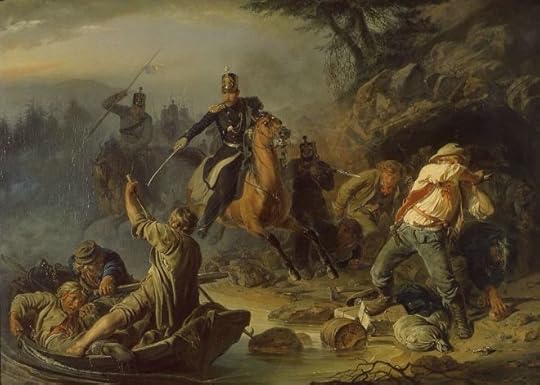
I’ve fallen into a process of writing until I find the start of a book. Real life, of course, isn’t tidy. Stories don’t have a beginning (except, perhaps, conception) or an end (except, perhaps, death). Before the beginning and after the end of life, the story belongs to other people, I suppose.
Novels are much tidier. We authors decide where the story starts and where it ends. And I always have trouble deciding.
Is the start the first meeting between my couple? Possibly, but what brought them to where they are? Maybe they’ve known one another for ever, but a crisis brings them together. Do we start with the crisis? Maybe they are already married, as in my latest novella for the Bluestocking Belles, but have drifted apart. Where does that one start?
I’m thinking about this because I’m beginning the next Redepenning novel, Unkept Promises. My hero and heroine have been married for seven years, and haven’t met or even been in the same country since the day of their wedding. Do I start with the circumstances that brought them together when she was fifteen and imprisoned by smugglers? Or with Mia arriving in Cape Town seven years later to take over from her husband’s mistress as lady of his house? Or with Jules turning up at his house to find things had changed?
Post me your start, or a pre-start unused scene, here in the comments?
Wherever I start, I need to know what happened before, so I’m thinking about writing the scenes in the smugglers den, even if they are only posted here or in my newsletter. It’ll go something like this.
At first, Jules thought the blow on the head had robbed him of his sight. But as he surfaced from the weight of the enormous headache that pinned him to the stone floor where they’d left him, he decided darkness was a more likely explanation. He moved cautiously, with protests from the bruises and aches from various kicks and blows the scurvy smugglers had landed. It didn’t take long to feel his way around the small uneven rock cave — with a sturdy wooden door — in which they’d placed him. It was empty, and he was alone.
Time crawled by as he waited for something to happen; time enough for hunger and thirst to gnaw away at his usual blithe disregard for his own mortality. He was sitting with his back against the wall, contemplating the mistakes that had brought him here, when he heard voices, so close they were almost in the room with him.
First, a groan. Then a girl’s voice, light and high. “Are you awake, Papa?”
The light came as a surprise, shining like a beacon from the other side of a barred opening set high up in one wall. Standing, Jules managed to reach the bars and pull himself up, to look through into another cell very like his own. A man, curled on a mess of rags and clothing, shifting restlessly. His eyes were shut, and he had not responded to the girl who crouched beside him. She was a skinny child, still boyish in shape, but he did not suppose that would save her from the smugglers. Jules made an instant vow to save her, whatever the cost.
The girl held the candle she had lit away in one hand to cast its light without dripping its wax, and brushed back the hair that fell over the man’s forehead.”Oh, Papa,” she said, her voice trembling.








June 18, 2018
Tea with the duchess – will the Canadian recluse refuse?

This is a bit of a prequel to a confrontation over tea…
The Duchess of Haverford studied the missive in her hand carefully, although there was no doubt about the message. The bold hand of the Earl of Chadbourn scrawled a message as succinct as it was unwelcome.
He will not come.
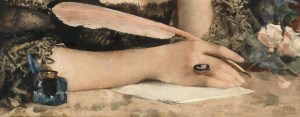 Randolph Wheatly, the earl’s brother-in-law had stormed into town sporting spectacular purple bruises and calling down the wrath of the Almighty on certain abusive and dishonorable members of His Majesty’s forces the day before. That he sought the assistance of his sister’s husband and the rest of his family spoke volumes about his desperation.
Randolph Wheatly, the earl’s brother-in-law had stormed into town sporting spectacular purple bruises and calling down the wrath of the Almighty on certain abusive and dishonorable members of His Majesty’s forces the day before. That he sought the assistance of his sister’s husband and the rest of his family spoke volumes about his desperation.
Rand Wheatly left London six years ago announcing to all and sundry that he would never return. Shattered by what he saw as betrayal by his cousin—the man who had been his closest childhood friend—he refused all attempts at reason and sailed for Canada on the first available ship. That the woman was, in Eleanor’s opinion, not worth the pain didn’t make the pain any less.
He spent the intervening years obtaining land—heavily timbered land. Now he was back, choking on his pride, and asking for help. Yet…
He will not come.
He sought the earl’s help, accepted his sister’s support, and even allowed the Duke of Sudbury, Chadbourn’s crony, to stick his ever-managing oar in the water, but the insufferable puppy wouldn’t take the advice or assistance of the Grenfords.
The one he needs is that cousin of his, she mused. She folded the note and tapped it on the arm of her chair, lost in thought. There had been another message, that one from Catherine, Rand’s sister and the earl’s intrepid wife. Eleanor had never heard Catherine so desperate. Six years of worry and the man turns up dirty, beaten, and breathing fire—no wonder the countess was frantic. He needed to gain control before he did something spectacularly stupid. Perhaps she could help. Perhaps she could give him a push in the direction of the cousin; if the two of them would simply talk to one another it might resolve any number of problems.
First I have to get him here.
“Bring my writing desk, please. Isadore,” she said to her companion, so lost in thought she failed to smile. If the stubborn man insists on acting like a child I may have to treat him like one. She took pen and began to write.
The Duchess of Haverford summons you…
_________________
Rand accepted the duchess’s summons, of course. How could he not? You can read the results here:
https://judeknightauthor.com/2018/03/13/tea-with-rand/
 About the Book, The Renegade Wife
About the Book, The Renegade Wife
Reclusive businessman Rand Wheatly finds his solitude disrupted by a desperate woman running with her children from an ugly past. But even his remote cabin in Upper Canada isn’t safe enough. Meggy Blair may have lied to him, but she and her children have breached the walls of his betrayed heart. Now she’s on the run again. To save them he must return to face his demons and the family he vowed to never see again.
It is available in Kindle format free with Kindle Unlimited or for purchase as ebook or in print:
The Renegade Wife is Book 1 in Caroline Warfield’s Children of Empire Series.
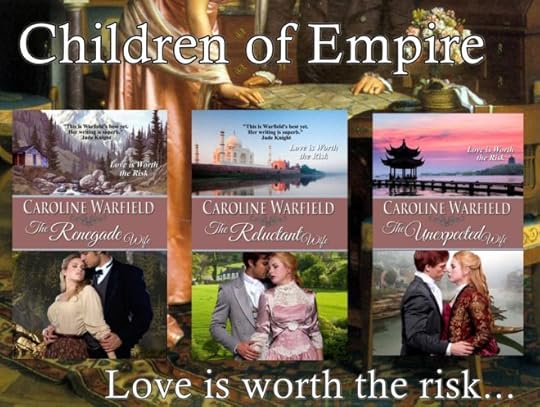 Three cousins, who grew up together in the English countryside, have been driven apart by deceit and lies. (You may guess a woman was involved!) Though they all escape to the outposts of The British Empire, they all make their way home to England, facing their demons and finding love and the support of women of character and backbone. They are:
Three cousins, who grew up together in the English countryside, have been driven apart by deceit and lies. (You may guess a woman was involved!) Though they all escape to the outposts of The British Empire, they all make their way home to England, facing their demons and finding love and the support of women of character and backbone. They are:
Randolph Baldwin Wheatly who has become a recluse, and lives in isolation in frontier Canada intent on becoming a timber baron, until a desperate woman invades his peace. (The Renegade Wife)
Captain Frederick Arthur Wheatly, an officer in the Bengal army, who enjoys his comfortable life on the fringes until his mistress dies, and he’s forced to choose between honor and the army. (The Reluctant Wife)
Charles, Duke of Murnane, tied to a miserable marriage, throws himself into government work to escape bad memories. He accepts a commission from the Queen that takes him to Canton and Macau, only to face his past there. (The Unexpected Wife)
Who are their ladies?
Meggy Campeau, the daughter of a French trapper and Ojibwe mother who has made mistakes, but is fierce in protecting her children. (The Renegade Wife)
Clare Armbruster, fiercely independent woman of means, who is determined to make her own way in life, but can’t resist helping a foolish captain sort out his responsibilities. (The Reluctant Wife)
Zambak Hayden, eldest child of the Duke of Sudbury, knows she’d make a better heir than her feckless younger brother, but can’t help protecting the boy to the point of following him to China. She may just try to sort out the Empire’s entangled tea trade–and its ugly underpinning, opium, while she’s there. (The Unexpected Wife)
Book 3, The Unexpected Wife, will be released on July 25.
Here’s a short video about it:
https://www.facebook.com/carolinewarfield7/videos/924791187669849/
For more about the series and all of Caroline’s books, look here:
https://www.carolinewarfield.com/bookshelf/
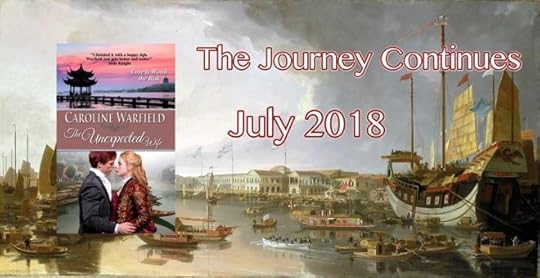 About the Author
About the Author
Caroline Warfield grew up in a peripatetic army family and had a varied career (largely around libraries and technology) before retiring to the urban wilds of Eastern Pennsylvania, where divides her time between writing Regency and Victorian Romance, and seeking adventures with her grandson and the prince among men she married.








June 15, 2018
Would you like to fly in my beautiful balloon?

Balloons rise over my valley at the start of the annual Wairarapa Balloon Festival
One of my characters is currently flying over 1840s Madras in a balloon, so I’ve been reading Richard Holmes’ book Falling Upwards. Balloons, he points out, gave our ancestors their “first physical glimpse of a planetary overview”. From up above balloonists could contribute to forecasting weather, researching geology and other earth sciences, and — if only because winds are fickle — improve (or make worse) international communication.
The first successful hot air balloonist were the Montgolfier brothers. They were the children of a French paper manufacturer, and one of them was a dreamer. Joseph-Michel Montgolfier watched laundry drying over a fire, and was much taken by the way it caught the hot air and floated upwards. In 1782, he made some experiments with a small box made from wood and cloth. Success led him to approach his brother, and he and Jacques-Étienne built a larger model together. In 1783, several experiments brought them to the attention of the King, as well as scientists and other flight enthusiasts. The first human passengers were carried October (tethered) and November (when they traveled 8 km in 25 minutes).
From the dawn of time, people had dreamed of flying. Now a lucky few could finally do so.
Frenchmen were the first hot-air balloonists, but others quickly took up the challenge. The French scored another first, though, with the first military balloon regiment, founded in 1794. The opposing armies hated them. They couldn’t do a thing without being observed from on high, so whenever the balloons came close enough, every weapon that could be mustered was fired at the basket. This, says Holmes, “made the military aeronaut’s position both peculiarly perilous and peculiarly glamorous.”
That was the beginning. Throughout the nineteenth century, aeronauts explored the limits of what was possible with a balloon, and sometimes — with dire consequence — beyond those limits. Holmes says that they came from many different walks of life, had many different approaches and interests, but all had in common a single compelling desire: they wanted to fly.
Nicolas Camille Flaummarion, one of those nineteenth century aeronauts, wrote of those early days when suggesting that the balloon was not the final answer to the desire for flight, and that some other method remained to be invented:
…already it has done for us that which no other power ever accomplished ; it has gratified the desire natural to us all to view the earth in a new aspect, and to sustain ourselves in an element hitherto the exclusive domain of birds and insects. We have been enabled to ascend among the phenomena of the heavens, and to exchange conjecture for instrumental facts, recorded at elevations exceeding the highest mountains of the earth.
Doubtless among the earliest aeronauts a disposition arose to estimate unduly the departure gained from our natural endowments, and to forget that the new faculty we had assumed, while opening the boundless regions of the atmosphere as fresh territory to explore, was subject to limitations a century of progress might do little to extend. In the time of Lunardi, a lady writing to a friend about a balloon voyage she had recently made, expresses the common feeling of that day when she says that ” the idea that I was daring enough
to push myself, as I may say, before my time, into the presence of the Deity, inclines me to a species of terror ” — an exaggerated sentiment, prompted by the admitted hazard of the enterprise (for Pilatre de Kozier had lately perished in France, precipitated to the earth by the bursting of his balloon), or dictated by an exultant and almost presumptuous sense of exaltation : for the first voyagers in the air, reminded by no visible boundary that for a few miles only above the earth can we respire, appear to have forgotten that the height to which we can ascend and live has so definite a limitation.








June 13, 2018
The right (or the wrong) clothes on WIP Wednesday
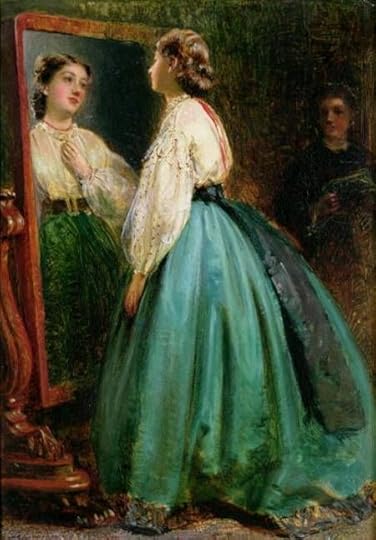
People say it shouldn’t matter, but it does. When you know you are well dressed, in clothes that suit you and that are suitable for the occasion, you can relax and enjoy yourself. Clothing that gives a character confidence, or clothing that doesn’t work, is often a feature of a story, making us sympathetic to the character or showing some aspect of their personality.
So this week, I’m looking for extracts that describe what your character is wearing and how they feel about it. Mine is from House of Thorns.
As her betrothed assisted her into his chaise on Sunday morning, Rosa was conscious of two conflicting emotions. One was relief that she could leave the house for long enough to attend the church service, since the new maids had shown themselves both willing and able to look after her father in her absence. The other was trepidation. She and Bear would be the center of attention once the banns were read for the first time. The Pelmans and the Thrextons would find something to censure, made up or real, and they had their supporters in the village.
I would feel more confident if I had something suitable to wear, she thought.
Bear had dressed for the occasion, pale breeches and stockings, a dark blue coat over an embroidered waistcoat with a creamy froth of lace at neck and cuff. He didn’t favor the excesses they showed in the fashion magazines she sometimes saw at the village shop, but the materials were of the best quality and beautifully cut to fit his frame.
Rosa’s Sunday-best gown had had more than six years of use, new clothes being a luxury the Neathams could not afford after the new Lord Hurley stopped the pension the former Lord Hurley had once paid. She had tried to keep it from dirt and harm, but six years is more than 300 Sundays, even allowing for those when she could not find anyone to sit with her father and had to miss services.
Turning the back panel to move the shiny spot, carefully mending tears, and cutting off the cuffs to replace them with a band taken from another gown could not disguise the fact that her Sunday-best would be a Monday-washday gown for almost any other woman in the parish.
Next to Bear, she looked like a pauper, which was not far from the truth.








June 10, 2018
Tea with memories

The duchess had to give her current companion credit for at least trying to hide her emotional turmoil. Evaline Grenford spilled the tea she was trying to pour, blotted the letter she was instructed to write, pricked her finger with the needle when she was set to some sewing, and completely forgot what she’d been sent for on five separate errands, so that she had to return to Eleanor to ask for the instructions again. But she denied anything was wrong; pasted on a smile that looked more like a rictus; insisted she was perfectly fine.
Until Her Grace set her to reading a story about a faithless man who left the woman who loved him, and then at last Evaline broke down into the tears she so desperately needed, and Eleanor was able to enfold her in her arms and listen to the story she already knew. A man who offered his love, but who took money from the duke and Evaline’s father to go away? Evaline’s heart was broken, and more — her pride was hurt.
“I am sure they must have threatened him,” the girl wailed.
From what Eleanor had heard, the young man had accepted his payment with every evidence of satisfaction. “Do you think so, my dear?” she asked, and Evaline coloured scarlet.
“No,” she whispered. “I think he did not love me as I loved him. Oh, but it hurts!”
Eleanor stroked the girl’s hair. “I know. I know, Evaline.”
“How can you know? You are married,” the girl wailed. “You have never lost as I have lost.”
Eleanor’s stroking hand did not pause; her comforting murmurs did not cease, but the eyes that looked sightlessly across the richly appointed apartment shone with unshed tears.

20 years earlier
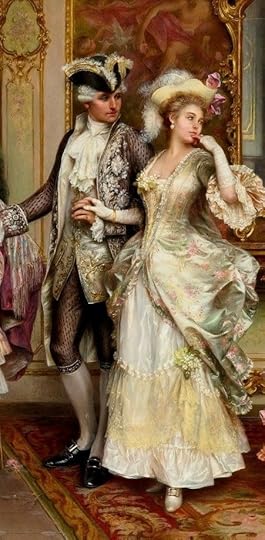 James appeared as if from nowhere, slipping his hand under hers and leading her aside through a doorway. The room beyond was not being used for this afternoon musicale. They were alone.
James appeared as if from nowhere, slipping his hand under hers and leading her aside through a doorway. The room beyond was not being used for this afternoon musicale. They were alone.
Eleanor threw herself into his arms, pressing her lips to his, and for a moment he returned the desperate passion of her kiss. But all too soon he drew back. “Eleanor. My love. I had to see you one last time.”
“Last time?” Eleanor had known it was coming ever since she had heard of the duel, but she did not want to believe it. “No, James. No, you cannot go.”
“If I stay, I face charges. The king is determined to make an example, and if the duke dies, I will be hanged for murder.”
Eleanor was shaking her head. She did not care about the duke. “This is all his fault,” she hissed. “But James, surely your father…”
“My father, your father, and Haverford. They’re all in it together. Eleanor, I hope he does die. At least then you will be safe.”
Eleanor shivered. She had refused her father’s plans to marry her to the Duke of Haverford, and the old beast had reacted by attempting to compromise her at a Society ball. No. Call it what it was — to ravish her, and with her father’s blessing. If James had not arrived in time…
“Come with me,” James begged. “I can look after you, darling. And we’ll be together. We can face anything together.”
Leave England and her mother and sister? Her friends? But Eleanor hesitated only for a moment. “Yes. Now? Shall I come now?”
Someone rattled the door James had locked, and they heard her companion’s — say, rather, her jailor’s voice. “Lady Eleanor? Lady Eleanor, are you in there?”
“I need to make some arrangements. I’ll send you a message, my love.”
They met for one more kiss, and then James slid up the window and climbed over the sill. “Tomorrow. I will come for you tomorrow,” he whispered.
“I’ll be ready,” she promised.
And those were the last words they had ever exchanged. That same night, her father sent her, heavily guarded, into the country. The very next day, so she found out later, the Duke of Winshire’s men had caught up with his disobedient son as James attempted to scale the walls into Haverford House, and had taken him bound and gagged aboard a ship bound for the East via the Cape of Good Horn.
He would come back, she told herself. She had merely to keep refusing her father, and one day he would come back. She endured imprisonment, even beatings and starvation, holding hard to her trust in her love, until the day the news came. James had been killed. She no longer had a reason to live, but her body refused to die. When Haverford offered once more for her hand, she accepted, hating him less than she hated her father. Though that would change.

This little bit of back story fits with my next story for the Bluestocking Belles. Paradise Regained catches up with James Winderfield, rebel son of the Duke of Winshire. He is very much alive, some 20 years after his attempt to elope with Lady Eleanor Creydon, our very own Duchess of Haverford and the mother of the Marquis of Aldridge.








Summertime reading from Authors of Main Street
 We’re a few days out from the publication of Summer Romance on Main Street, more than 150,000 words with six novellas and another to come in an update.
We’re a few days out from the publication of Summer Romance on Main Street, more than 150,000 words with six novellas and another to come in an update.
I had a quick skim through an advance copy this morning when the publisher asked us all to take a look for layout issues, and was wildly tempted to stop and read. It’s a treat to come! Here are some of the blurbs for the stories. I’ll add more as I get them from my fellow authors.
Forget Me Not by Carol de Vaney
When guilt, grief, and love collide, Sarah Hall walks away from the only man she ever loved—five years later, after a chance meeting brings them together again, blame and a regretful judgement fall away.
Ted West’s short-lived marriage left him with a four-year-old daughter to raise alone. The latest misunderstanding cannot mend the hurt and harsh words between Ted and Sarah, unless forgiveness steps in.
Beached by Jude Knight
Grieving for the grandparents who raised her and still bruised from betrayals in New York City, Nikki Watson returns to her childhood home in Valentine Bay.
Zee Henderson has built a new life in New Zealand: friends, a job he enjoys and respect he earned for himself, without the family name and money he left behind.
The attraction between Nikki and Zee flames into passion, until Zee’s past arrives on their doorstep and washes away their coastal paradise.
50 Miles at a Breath by Lizzi Tremayne
When equine veterinary student Lena and veteran pilot Blake fall in love, vet school and his past experiences intrude. Add in a long-distance relationship, and things get just plain hard.
A grueling endurance race forces them to draw on their strengths and face their fears—together.








June 6, 2018
Landscapes and surroundings on WIP Wednesday

I find descriptions hard to write, but stories need them. Our readers want to be able to drop themselves into the scene, and authors need to give them at least a few clues.
This week, I’m inviting writers to drop a description into the comments. Mine is from Beached, which is coming out next week in the box set Summer Romance on Main Street.
The shape of the harbor had given Valentine Bay its name: a heart on its side. A gap at the eastern point provided entrance to the harbor. On the western side, directly opposite, the wharves and moorings of the fishing port occupied a rocky promontory between two gently curved beaches. North Beach was currently undeveloped farm and bush land, though the planned hotel would change that. On the shores of South Beach, the settlement spread from the fishing port around the curve of the southern lobe of the heart and beyond, stretching partway along the road that led to the historic lighthouse at the harbor entrance.
Most of the shops in Valentine Bay lined one side of Beach Road or the other. That hadn’t changed. The shops themselves had—in her childhood, there’d been half a dozen businesses offering services and products to the locals and the rare visitor. A dairy, a fish and chip shop, a general store, a bakery, a book shop that also sold stationery and gifts, a garage with petrol pumps out the front and a workshop out the back. If any of those survived, they had gone upmarket to match the twenty or so others that now extended the shopping area far beyond the boundaries she remembered.
On the coast side of the road, the shops, cafes and restaurants backed onto the beach reserve, a wide stretch of lawn with picnic tables and public barbecue stations scattered among the pohutukawa trees and plantings of tough flax and ornamental grasses.
The businesses on the other side backed into the hill, no longer half farmland, but split up into residential lots with an eclectic mix of houses: Victorian villas cheek-by-jowl with modern beach extravaganzas and little square mid-20th century holiday houses, or baches as they were known here in New Zealand’s North Island.











